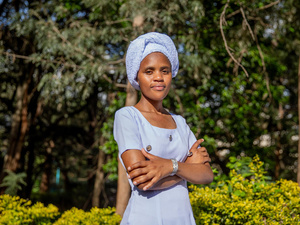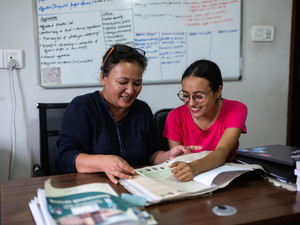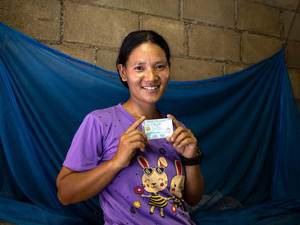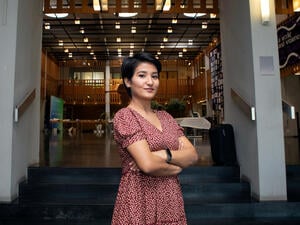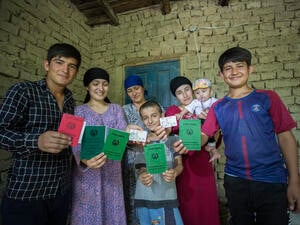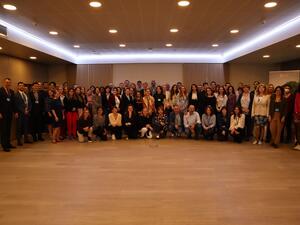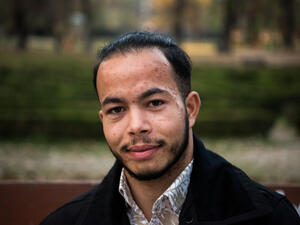Statelessness: Hoping to acquire a nationality and put down roots
Statelessness: Hoping to acquire a nationality and put down roots

Railya Abulkhanova is an ethnic Tatar who was born Kazakhstan. She now lives in France and hopes that she will gain citizenship soon. She will address a global forum on statelessness in the Netherlands.
BRUSSELS, Belgium, September 1 (UNHCR) - Three years ago, Railya Abulkhanova told a UNHCR film crew that she felt like a tumbleweed. "It rolls . . . with the breeze it rolls away. That is what it is. That is statelessness," she said in the story-telling series interview. "And me; I want to put down roots," Railya added.
Like many other stateless people around the world, including thousands from former Soviet republics, she's still waiting. Without a nationality, stateless people find it difficult to access the services and rights enjoyed by citizens. But for the first time in many years, and after several failed attempts, Railya hopes she is close to getting a nationality.
At the time of the 2011 interview, Railya, an ethnic Tatar, was living in France after being registered as a stateless person. She was born in Kazakhstan when it was a Soviet Republic, and in 1990 went to university in the Russian city of Ufa at the age of 17. She was a Soviet citizen with a passport, but the young woman lived in Russia on a temporary residency permit, known as a propiska.
Life seemed good, but in 1991 the Soviet Union disintegrated and Railya and tens of thousands of other people fell through the cracks as newly independent states like Kazakhstan passed their own nationality legislation. "Our minds just could not process the information that the [Soviet] Union had broken up. No one believed that it could happen," Railya told UNHCR recently in a phone call from France.
She moved in 1995 to study in Tashkent in Uzbekistan, another former Soviet republic, where she worked as a teacher and completed a PhD in philology. In 2005, she applied for naturalization, hoping that her status as a university professor with several publications to her name, would ease the process ¬- she was wrong.
But Railya is grateful to France, where she moved to in 2009 after marrying a French citizen. She was granted formal status as a stateless person, giving her some measure of assistance. Railya told UNHCR that getting this status had given her "a certain confidence . . . some sort of certainty of my situation, as well as theoretically the right to work, studies and medical help."
Recognition by France that she is stateless has not solved Railya's problems. She is entitled to work but has struggled to find full-time employment, working sporadically as an interpreter. Initially, potential employers treated her with suspicion because they were unfamiliar with the concept of statelessness. Now, she said, they "ask fewer questions about my strange status" because they have seen her UNHCR story-telling video on YouTube.
When France registered Railya as stateless, she was also entitled to a travel document. Despite this, she continues to face problems while travelling abroad, including going back to Kazakhstan to visit her parents.
"It is an outdated document," she said of the French-issued laissez-passer, adding that "because of this travel document I get stopped at the immigration control for 2-3 hours." She said it was easier for her husband to get a visa for Kazakhstan than for her. "I am Kazakh. He is not," she added, noting the irony.
In 2011, a fed up Railya also first applied for French citizenship, but she was rejected because she was unemployed at the time. Despite this setback, Railya submitted a fresh application earlier this year, based on her marriage.
Railya had to submit the application twice because French immigration officials found an error in her husband's birth certificate. However, despite all the challenges and after searching through archives, Railya is hopeful for a positive reply.
And she is also feeling more confident about finding permanent employment. Two years ago, she completed a secretarial course which helped her find work on a four-month project with an American agricultural firm. "The feeling of home... for me it is a long forgotten feeling and reminds me of the childhood memory of my first crush in elementary school ... but something similar to this feeling began to appear when I was working," she said.
Much remains to be done to reduce the number of stateless people in France (more than 1,200) and Europe (an estimated 600,000) and to ensure that people like Railya can enjoy basic rights and the chance to acquire a nationality one day.
"I am sure that I will have a country of my own someday. And I will be able to say, 'I'm coming home.' And I'll have the chance to build my future," said Railya, who will have a chance to tell her story later this month in the Netherlands. She will be a speaker at a three-day global forum on statelessness to be co-hosted in The Hague by UNHCR and Tilburg University.
By Valeriia Cherednichenko in Brussels, Belgium

